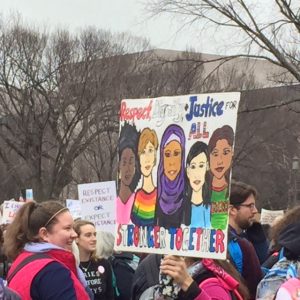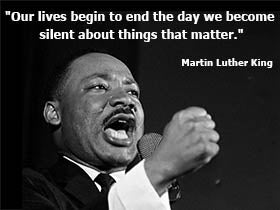[This blog was originally posted on January 20 through the IMAXI Cooperative. Since then, the millions of people at Women’s Marches across the United States — and the world — offer much reason for hope that a great many people will stand up and speak up for the rights of all of us when they are under threat. Our readiness to protest, to stand for dignity, will need to persist, for reasons that extend far be yond any particular policy objective….]
yond any particular policy objective….]
“Our lives begin to end the day we become silent about things that matter.” — Martin Luther King, Jr.
“Show up, dive in, stay at it,” implored President Obama in his recent farewell address. In a different context, Congressman John Lewis (the civil rights leader best known for his courage in leading a peaceful 1965 march for voting rights, during which he was severely beaten by state troopers as the march got underway in Selma, Alabama), who serves as a moral compass for so many, including myself, also recently spoke of the need to “stand up, speak up, and speak out.”
I expect that over the next several years, in the United States, many people will be in the streets, standing up and speaking up, as the next administration takes charge amid widespread fear that it will seek to roll back a sweeping array of human right and social justice advances. Yet probably far more people who deeply oppose what appears to lie ahead will not join the marches, rallies, and other avenues of peaceful protest. One reason: quite understandably, they may feel – as many of those who decide to march or otherwise make their voices heard might feel as well – that those in power in Washington will pay them no heed. What good is protesting, they may wonder, if when they speak truth to power, no one listens?
Yet with good reason, such protests have long been at the core of social justice movements – and are at the heart of what we need to do when justice is on the line in the days and years ahead. I believe we need to speak out whenever we see injustice – even when there appears little chance that those who hold office will heed our call. Here are reasons why.
* Affirming the dignity of the oppressed: Like so many, I have heard the passion in the voices of people who belong to routinely disparaged communities, yet who still have the courage to speak out. Most recently it was at a rally to affirm the rights of immigrants I attended as part of a national day of action for immigrant rights. It was the voice of a Latina woman. She will be threatened with deportation if the next president rolls back protections for immigrants who, like her, entered the United States as children without proper documents (one of the Dreamers protected as part of the Obama Administration’s Deferred Action for Childhood Arrivals [DACA] program). She speaks out, insisting that in our country, justice will yet prevail. Her voice rings with determination and dignity, courage and conviction. She has, as we all have, the power to resist injustice. She has surely been told more than once that she does not count, that she is “illegal,” that she should keep quiet. Yet in standing tall, she declares that she does matter, that she is a person equal to every other person – and that no, no, she will not be silenced. Succeed or not in preserving DACA, this struggle for justice, her belief that she has the capacity – with all of us by her side – to make powerful forces bend to an almost sacred insistence on justice fills her with purpose. No doubt this not only lifts her spirits, but it also lights a flame within the core of her humanity that casts a light upon us all.

Image courtesy of IMAXI Cooperative.
And how much more impact she can have when tens, hundreds, thousands of people stand with her. It is no wonder that social justice movements are infused with insistent commitments to solidarity. That is why we stand together – those whose rights are under the greatest threat alongside those (like me) who have attained a certain level of privilege and who are not in immediate peril. When we stand in solidarity with immigrants, Muslims, and everyone else who may be directly harmed, told that they do not belong here, or that their lives don’t really matter – when we say, yes you belong, you are equal to everyone, you are as important as everyone – that message is itself of real value and consequence.
* Bending the arc: Social justice movements do not form and flourish when the path ahead is short and straight, but rather when it is long and difficult, the odds steep. The people in these movements are not presented with an easily accessible path to justice. Instead, they must forge it. They must themselves, to borrow from Dr. King, bend the arc of history towards justice. When you are part of these movements, you contribute to their strength, to their powerful efforts to change minds about what is right and necessary, to their ability to alter political incentives, and ultimately, to change unjust policies. If we nourish our united power to protect justice, then solidarity and resistance will make a difference, if not immediately, then in the course of time – across the arc of history.
* Affirming our own humanity: One of the tremendous beauties of human life is that we are all connected to the world around us. Our lives are products of the generations that preceded us, and in turn, the future will be as it is because of how our generation, how we, shape it. We are indeed part of that “circle of life.” We may occupy only a negligible bit of space and exist for a blink of time, yet as sentient, intelligent, and (at our best) loving beings, we are one of the true gems of the universe. But to honor our humanity, to be fully part of the human narrative, we need to take our turn in helping to paint the human masterpiece that is continually being created. Speaking out about what matters in the world around us is a way to pick up our brush, add our individual strokes, even our own signatures. We honor what it is to be human and each affirm our own connection to humanity.
* Remaining a beacon of liberty: Americans have an added responsibility, I believe, as citizens (formally or, like the woman of whom I wrote, at heart) of a country whose highest ideals, however still too often diminished in practice, are at the core of what it means to be an American. Today, ours is still a land that differs from most in history, and many that exist today. You can be (or become) an American no matter where you or your parents were born, what you look like, whatever your race, your religion (if any), your ethnicity. At least in America’s noblest conception, what binds us together as Americans are certain shared values: “liberty and justice for all,” equal opportunity for all, equal protection under the law. If indeed there is something to the idea of an American exceptionalism, it is paradoxically rooted in the universality of what it means to be an American: the fact that anyone from anywhere can be an American, not only a citizen by law, but accepted as a full member of our community, reflecting the United States’ rainbow mix of diverse cultures and shared values.
This is the promise America holds at its best. This is the America that can be a beacon to the world, that can inspire hope, that teaches that if the people of a nation formed of the world’s diversity can live together, cherishing our differences while bound by the fervent belief in the equality of all, then liberty, equality, and justice can be the writ of any land. We cannot allow the promise that America represents to be tarnished.
Those who hold tight to these ideals must represent the counterforce to policies and statements that would undermine them. We must to make ourselves visible to our neighbors in the world, rallying in support of an inclusive America, one that respects the rights, dignity, and equality of all people. In so doing, we keep the ideal of America alive, the torch of liberty burning bright.
* For the sake of our children: What will define the United States of America for rising generations? Will they understand it to be a country of hope or of fear, of inclusion or of division, of rights for all or only for some? When we stand up for the rights of all people – by marching and rallying, protesting and organizing, as well as by meeting and calling and emailing our representatives, proposing our ideas on blogs or in the press, signing petitions – we model for younger generations what it means to a part of this country. We define for them the responsibilities of citizenship (irrespective of one’s formal status) so that as they grow older, they might themselves join tomorrow’s movements for social justice. We demonstrate that justice is resilient, that democracy’s self-inflicted wounds, even when deep, need not be mortal. But if we remain silent as immigrants are treated unjustly, as Muslims and others are discriminated against, as people’s health care is callously ripped away from them, then we allow a different type of America to be defined and take root, one that is a stranger to its erstwhile highest ideals and principles. In standing together, with each other, for each other, visible to the world, we keep the ideals of America alive for the generations to come.
And one more thing. Just maybe that discriminatory policy that we oppose because it is unjust, or that law that will likely cause great harm, or that proposal that would cut funding for vitally needed services, just maybe we can stop them from happening. Just maybe, even in these times of great uncertainty and distress, we can still, even now, keep bending the arc of history towards justice.



